Understanding Anxiety, Depression, and Eating Disorders: Causes, Symptoms, and Treatment
Added on 2023-01-18
31 Pages6226 Words50 Views
Psychopathology
Name
Professors’ name
Institution
Date
Name
Professors’ name
Institution
Date
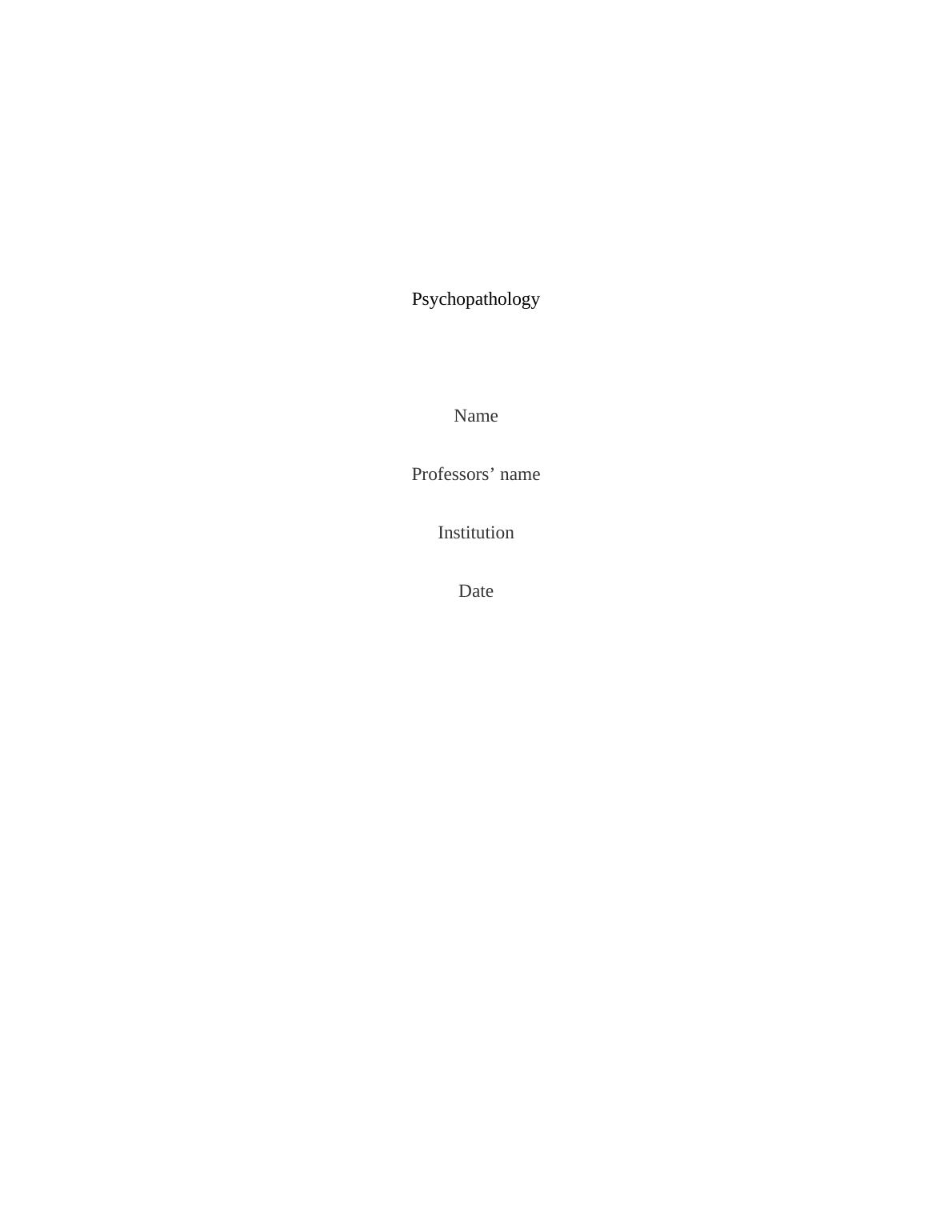
Introduction
Mental illness refers to a wide range of mental complications and mental health conditions that
often affects one's thinking capacity as well as their behavior and mood. In the initial stages, they
are referred to as mental health concerns but upon persistence and unending signs and symptoms,
that's when they are diagnosed as mental illnesses (Abuse, 2013 p.46).
Mental health illnesses comprise of complications like depression, eating disorders, anxiety
disorders, various addictive behaviors, and schizophrenia.
Mental illnesses often have the ability to make one’s life miserable as they do cause problems in
one’s daily life especially at school and also in relationships (Westerhof & Keyes, 2010 p.111).
This write-up seeks to understand and determine some of the causes, symptoms as well as the
treatment for three mental illnesses that is; anxiety depression and eating disorders.
1. Anxiety
Anxiety experiencing anxiety occasionally is a normal thing for every human being. However,
there are certain extreme cases where individuals tend to experience extremely intense and
persistent worry as well as fear about certain situations or things (Kazdin & Blase, 2011 p.34). In
such cases, these people are said to be experiencing anxiety disorders. In most cases, anxiety
disorders are accompanied by repeated episodes of intense feelings of fear as well as extreme
terror that often reach a peak for short periods of time. Panic attacks.
Usually, such feelings of anxiety, as well as the constant panic attacks, tend to interfere with
one's ability to undertake their daily activities in a normal way. Statistics indicate that when such
Mental illness refers to a wide range of mental complications and mental health conditions that
often affects one's thinking capacity as well as their behavior and mood. In the initial stages, they
are referred to as mental health concerns but upon persistence and unending signs and symptoms,
that's when they are diagnosed as mental illnesses (Abuse, 2013 p.46).
Mental health illnesses comprise of complications like depression, eating disorders, anxiety
disorders, various addictive behaviors, and schizophrenia.
Mental illnesses often have the ability to make one’s life miserable as they do cause problems in
one’s daily life especially at school and also in relationships (Westerhof & Keyes, 2010 p.111).
This write-up seeks to understand and determine some of the causes, symptoms as well as the
treatment for three mental illnesses that is; anxiety depression and eating disorders.
1. Anxiety
Anxiety experiencing anxiety occasionally is a normal thing for every human being. However,
there are certain extreme cases where individuals tend to experience extremely intense and
persistent worry as well as fear about certain situations or things (Kazdin & Blase, 2011 p.34). In
such cases, these people are said to be experiencing anxiety disorders. In most cases, anxiety
disorders are accompanied by repeated episodes of intense feelings of fear as well as extreme
terror that often reach a peak for short periods of time. Panic attacks.
Usually, such feelings of anxiety, as well as the constant panic attacks, tend to interfere with
one's ability to undertake their daily activities in a normal way. Statistics indicate that when such
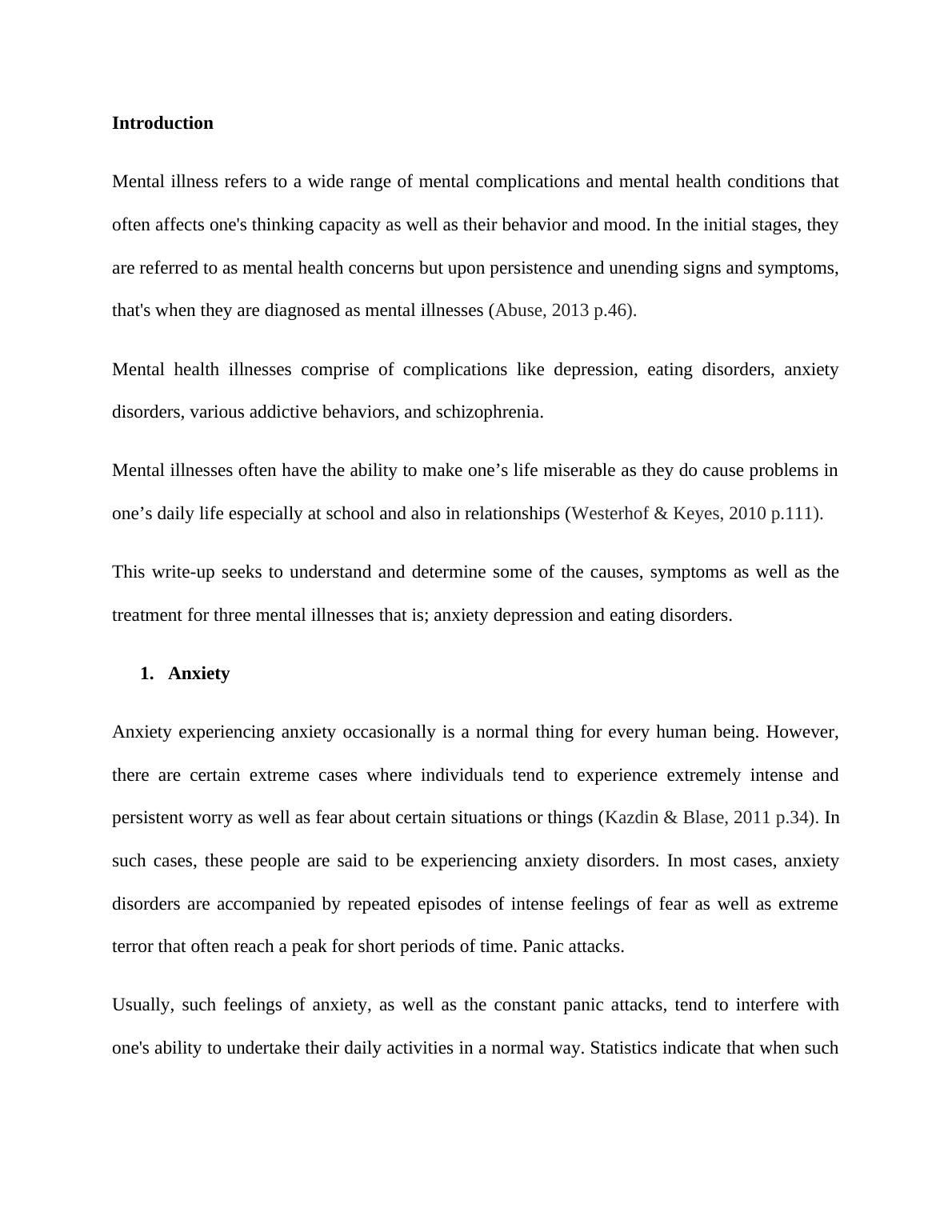
panic attacks persist for the long term they become tend to pose an actual danger and can even
last for long periods of time (Corrigan et al, 2012 p.71).
There are various types of anxiety disorders, some of these are outlined below;
a) Specific phobias-This refers to an intense fear over a specific situation or an object.
Examples of such could be heights or flying. The fear of such situations and/or objects is
often intense and in most cases, one tends to avoid getting into such situations.
b) Social anxiety disorder-This referrers to the feeling of constant and overwhelming worry
over certain and everyday social situations (Livingston & Boyd, 2010 p.68). In most
cases, people often feel that others are judging and thus feelings of embarrassment are
often a common thing with this kind of anxiety disorder.
c) Panic disorder-This refers to the terror that often strikes randomly. It is characterized by
effects such as chest pains, irregular heartbeats that brings about constant palpitations and
sometimes sweating.
d) Generalized anxiety disorders-As the name suggests this anxiety disorder is often
characterized by feelings of unrealistic worry and tension with no reason at all (Angell,
2011 p.59).
Signs and Symptoms of Anxiety
Anxiety disorder often has various unique signs and symptoms. Some of the signs and symptoms
are outlined below;
Excessive Worrying-Anxiety has often associated with high degrees of worry and in most cases,
it is often as a result of the thing that triggers the panic attacks (Vigo, Thornicroft, Atun, 2016
p.49).
last for long periods of time (Corrigan et al, 2012 p.71).
There are various types of anxiety disorders, some of these are outlined below;
a) Specific phobias-This refers to an intense fear over a specific situation or an object.
Examples of such could be heights or flying. The fear of such situations and/or objects is
often intense and in most cases, one tends to avoid getting into such situations.
b) Social anxiety disorder-This referrers to the feeling of constant and overwhelming worry
over certain and everyday social situations (Livingston & Boyd, 2010 p.68). In most
cases, people often feel that others are judging and thus feelings of embarrassment are
often a common thing with this kind of anxiety disorder.
c) Panic disorder-This refers to the terror that often strikes randomly. It is characterized by
effects such as chest pains, irregular heartbeats that brings about constant palpitations and
sometimes sweating.
d) Generalized anxiety disorders-As the name suggests this anxiety disorder is often
characterized by feelings of unrealistic worry and tension with no reason at all (Angell,
2011 p.59).
Signs and Symptoms of Anxiety
Anxiety disorder often has various unique signs and symptoms. Some of the signs and symptoms
are outlined below;
Excessive Worrying-Anxiety has often associated with high degrees of worry and in most cases,
it is often as a result of the thing that triggers the panic attacks (Vigo, Thornicroft, Atun, 2016
p.49).
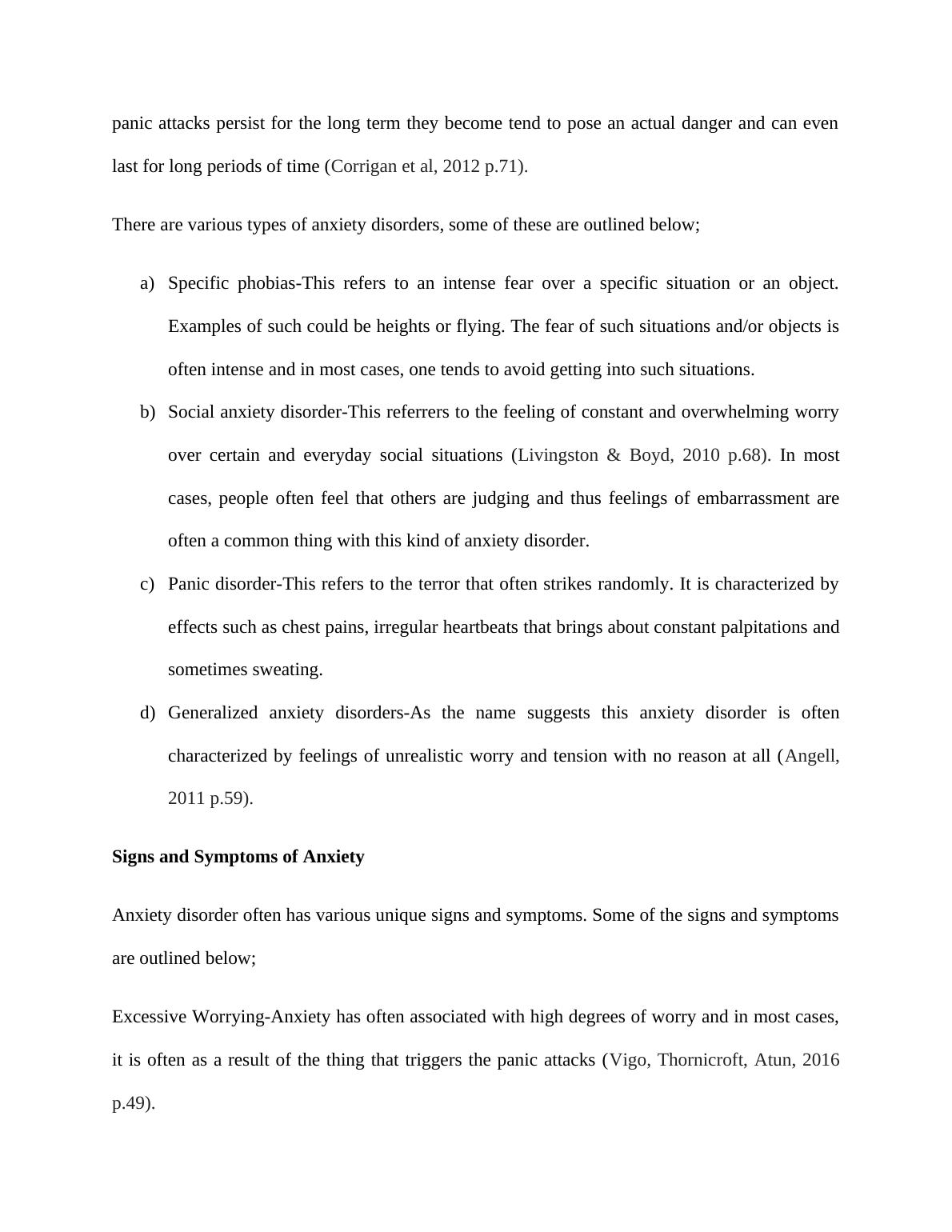
Feelings of agitation-This characterized by sweaty palms, a dry mouth, racing pulse, and shaky
hands.
Restlessness- Feelings of uncomfortable and wanting to move at all times (Corrigan, Druss,
Perlick, 2014 p.23).
Irritability- Signs of excessive irritability especially when the disorder is at its worst.
Tense muscles and concentration difficulties.
Treatment for Anxiety
a) Exercise-Exercises are a very efficient way of burning down extra anxiety especially
those caused by stressful situations and circumstances.
b) Meditation-Meditation is a very important technique that is used in the treatment of
almost all kinds of anxieties. It helps to slow down racing thoughts and therefore
reducing anxiety as well as stress.
c) Writing-Writing is an appropriate way in which one expresses their anxiety, research
suggests that different forms of writing such as journal writings play a very crucial role in
the treatment of anxiety.
d) Aromatherapy-This refers to smelling of soothing plants, oils, and perfumes with certain
aromas that induce feelings of comfort and relaxation (Thornicroft, 2011 p.107).
e) Medication-Different types of medications have been used in the treatment of therapy.
Medications that are often used consist of tricyclics, benzodiazepines, and anti-
depressants (O'Hara & Wisner, 2014 p.62).
Causes of Anxiety
hands.
Restlessness- Feelings of uncomfortable and wanting to move at all times (Corrigan, Druss,
Perlick, 2014 p.23).
Irritability- Signs of excessive irritability especially when the disorder is at its worst.
Tense muscles and concentration difficulties.
Treatment for Anxiety
a) Exercise-Exercises are a very efficient way of burning down extra anxiety especially
those caused by stressful situations and circumstances.
b) Meditation-Meditation is a very important technique that is used in the treatment of
almost all kinds of anxieties. It helps to slow down racing thoughts and therefore
reducing anxiety as well as stress.
c) Writing-Writing is an appropriate way in which one expresses their anxiety, research
suggests that different forms of writing such as journal writings play a very crucial role in
the treatment of anxiety.
d) Aromatherapy-This refers to smelling of soothing plants, oils, and perfumes with certain
aromas that induce feelings of comfort and relaxation (Thornicroft, 2011 p.107).
e) Medication-Different types of medications have been used in the treatment of therapy.
Medications that are often used consist of tricyclics, benzodiazepines, and anti-
depressants (O'Hara & Wisner, 2014 p.62).
Causes of Anxiety
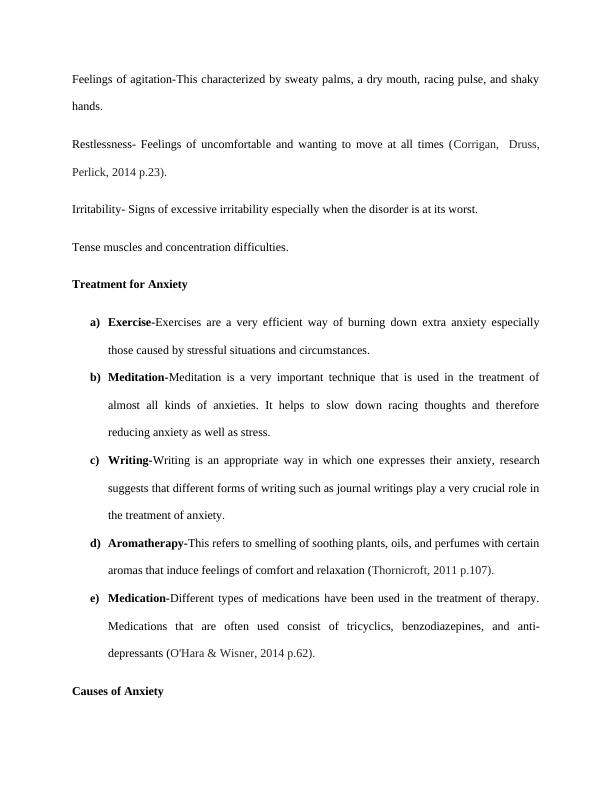
Genetic Causes of Anxiety
Genetics play a very crucial role in determining whether or not an individual is likely to develop
anxiety or not. Researches have examined the role of one's genes in anxiety and despite them
being at the preliminary stages, there is still circumstantial prove that a person is likely to
develop anxiety because of their genes (Corrigan & Rao, 2012 p.44). This is especially if their
family members had an anxiety disorder.
Treatment-Use of medication
Advantages of medication
Most effective in cases where disorder is at its initial stages
Disadvantages of medication
Medications could have some serious side effects
Treatment for genetic causes of anxiety
Treatment for genetic cause of anxiety is medication. Medications that are often used consist of
tricyclics, benzodiazepines, and anti-depressants
Psychodynamic causes of Anxiety
The psychodynamic theory of psychology dictates that anxiety is brought about by unconscious
motivations within an individual clash with various constraints in the conscious mind
(Schomerus et al, 2012 p.33). This is often dominant in people with generalized anxiety disorder.
Genetics play a very crucial role in determining whether or not an individual is likely to develop
anxiety or not. Researches have examined the role of one's genes in anxiety and despite them
being at the preliminary stages, there is still circumstantial prove that a person is likely to
develop anxiety because of their genes (Corrigan & Rao, 2012 p.44). This is especially if their
family members had an anxiety disorder.
Treatment-Use of medication
Advantages of medication
Most effective in cases where disorder is at its initial stages
Disadvantages of medication
Medications could have some serious side effects
Treatment for genetic causes of anxiety
Treatment for genetic cause of anxiety is medication. Medications that are often used consist of
tricyclics, benzodiazepines, and anti-depressants
Psychodynamic causes of Anxiety
The psychodynamic theory of psychology dictates that anxiety is brought about by unconscious
motivations within an individual clash with various constraints in the conscious mind
(Schomerus et al, 2012 p.33). This is often dominant in people with generalized anxiety disorder.
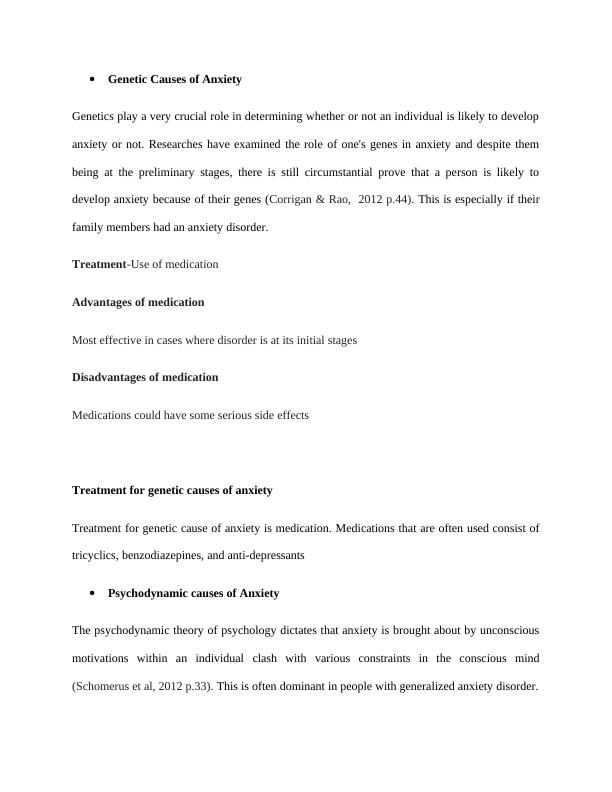
Various psychodynamic causes of anxiety could comprise of issues such as;
-Conflict in one mind between the need for independence as well as the extreme fear for
rejection
-A conflict between ones need to achieve success and their fear of failure
-Fear for not being good enough and not being in a position to make a good impression towards
someone important or people you care about.
Treatment for psychodynamic causes of anxiety
Treatment of psychodynamic causes of anxiety is the psychodynamic approach
Advantage of psychodynamic therapy
This therapy facilitates training in psychodynamic therapy as well as transfer of research in a
clinical practice.
Most effective especially when administered at an early stage
Increases confidence especially in a person’s abilities
Boosts a person’s self esteem
Disadvantages of psychodynamic therapy
It’s a long process that often delays immediate need for medication especially for patients with
serious complications.
-Conflict in one mind between the need for independence as well as the extreme fear for
rejection
-A conflict between ones need to achieve success and their fear of failure
-Fear for not being good enough and not being in a position to make a good impression towards
someone important or people you care about.
Treatment for psychodynamic causes of anxiety
Treatment of psychodynamic causes of anxiety is the psychodynamic approach
Advantage of psychodynamic therapy
This therapy facilitates training in psychodynamic therapy as well as transfer of research in a
clinical practice.
Most effective especially when administered at an early stage
Increases confidence especially in a person’s abilities
Boosts a person’s self esteem
Disadvantages of psychodynamic therapy
It’s a long process that often delays immediate need for medication especially for patients with
serious complications.
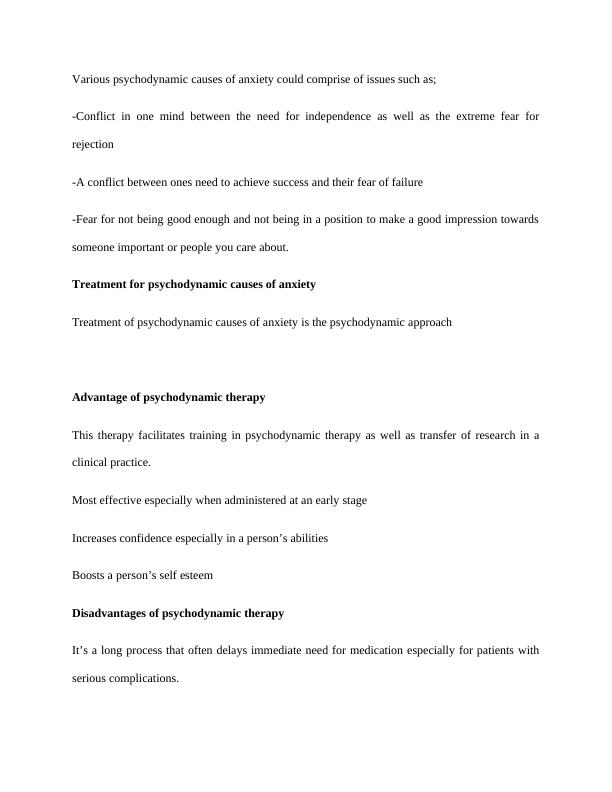
Cognitive causes of Anxiety
These cases often involve a certain way in which individuals twist and distort information from
their immediate environment and thus triggering cases of anxiety and/or panic (Bögels et al,
2010 p.90).
Some of the cognitive causes of anxiety are enumerated below;
-Selective Abstraction, this often arises when one makes judgments based on only some
information and disregards other information.
-Overgeneralization, this involves making conclusions over limited occurrences.
-Labeling, this involves putting a label on oneself after a certain negative experience
-Arbitrary inference, this usually happens when one makes judgments about something even
without any supporting information.
Treatment-Cognitive behavioral therapy
Advantages of Cognitive behavioral therapy for treatment of anxiety
Can be completed in relatively short periods of time in comparison to other techniques
Usually helpful in cases where medications do not work
It’s highly structured and this means that it can be provided in various forms such as self-help
books and even computer programs (Schomerus et al, 2012 p.56).
Disadvantages of Cognitive therapy for treatment of anxiety
Not suitable for patients with complex cases of anxiety
These cases often involve a certain way in which individuals twist and distort information from
their immediate environment and thus triggering cases of anxiety and/or panic (Bögels et al,
2010 p.90).
Some of the cognitive causes of anxiety are enumerated below;
-Selective Abstraction, this often arises when one makes judgments based on only some
information and disregards other information.
-Overgeneralization, this involves making conclusions over limited occurrences.
-Labeling, this involves putting a label on oneself after a certain negative experience
-Arbitrary inference, this usually happens when one makes judgments about something even
without any supporting information.
Treatment-Cognitive behavioral therapy
Advantages of Cognitive behavioral therapy for treatment of anxiety
Can be completed in relatively short periods of time in comparison to other techniques
Usually helpful in cases where medications do not work
It’s highly structured and this means that it can be provided in various forms such as self-help
books and even computer programs (Schomerus et al, 2012 p.56).
Disadvantages of Cognitive therapy for treatment of anxiety
Not suitable for patients with complex cases of anxiety
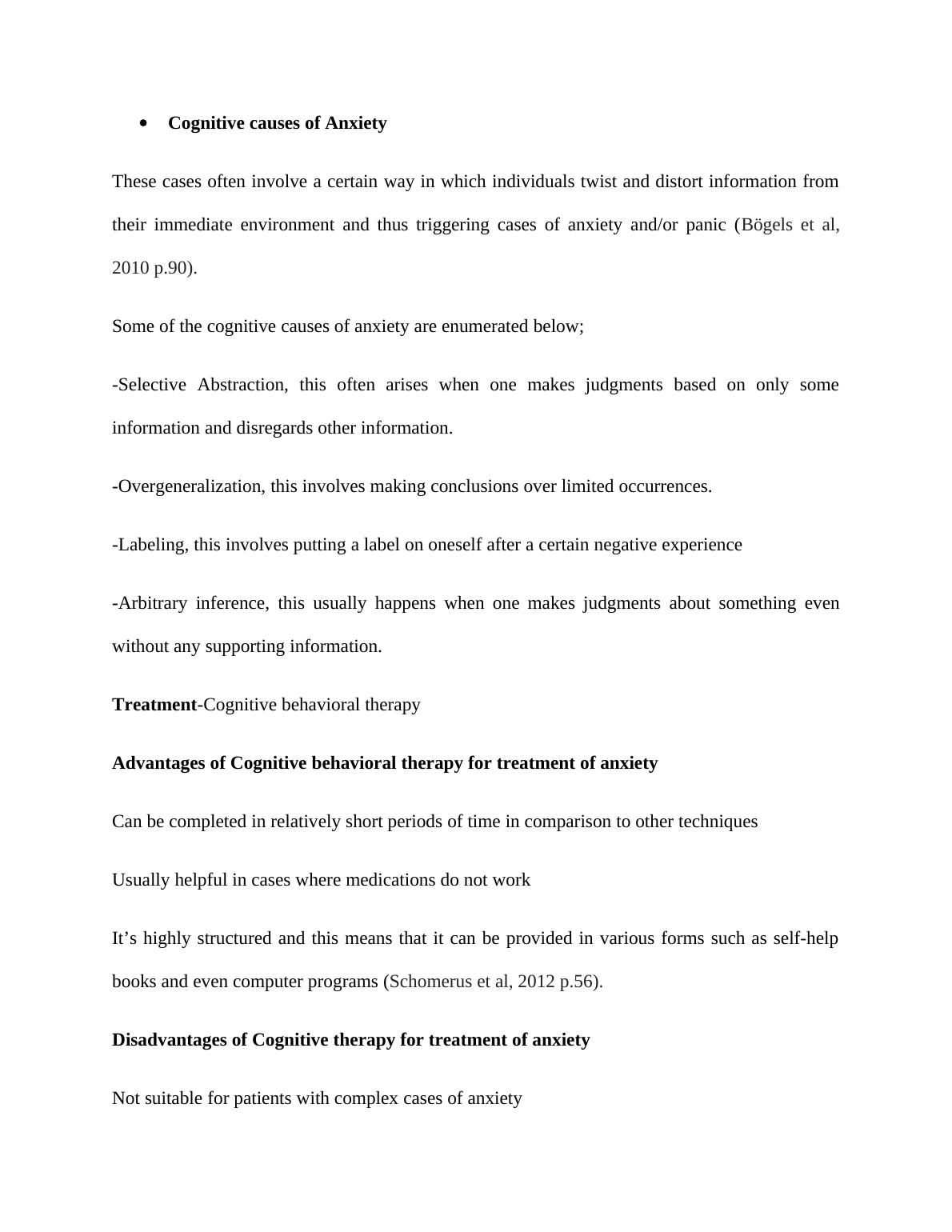
Time consuming especially in attending its numerous sessions
Needs commitment which is always not the case with many patients
Behavioral causes of anxiety
This refers to certain behaviors than one engages in either intentionally or unintentionally and
causes anxiety.
Some of the common behaviors that are likely to cause anxiety are outlined below;
-Denial
-Fishing for reassurance
-Alcohol and Drug Use
-Thought to stop
-Avoidance
Treatment-Use of different behavior therapies such as exposure therapy
Advantages of Behavior therapy
Usually helpful in cases where medications do not work
It’s highly structured and this means that it can be provided in various forms such as self-help
books and even computer programs
Disadvantages of Behavior therapy
Not suitable for patients with complex cases of depression
Needs commitment which is always not the case with many patients
Behavioral causes of anxiety
This refers to certain behaviors than one engages in either intentionally or unintentionally and
causes anxiety.
Some of the common behaviors that are likely to cause anxiety are outlined below;
-Denial
-Fishing for reassurance
-Alcohol and Drug Use
-Thought to stop
-Avoidance
Treatment-Use of different behavior therapies such as exposure therapy
Advantages of Behavior therapy
Usually helpful in cases where medications do not work
It’s highly structured and this means that it can be provided in various forms such as self-help
books and even computer programs
Disadvantages of Behavior therapy
Not suitable for patients with complex cases of depression
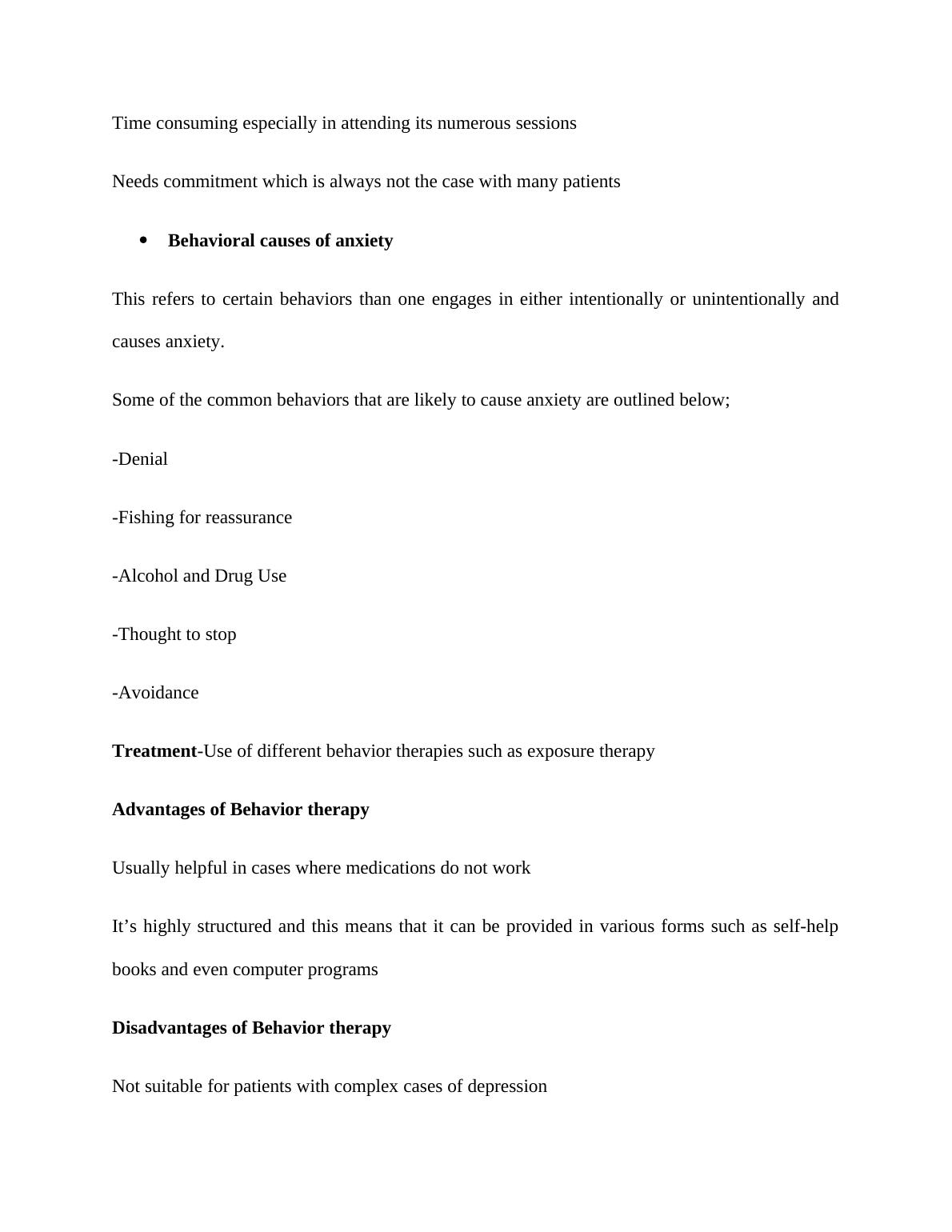
End of preview
Want to access all the pages? Upload your documents or become a member.
Related Documents
Nursing care of the patient with anxiety disorderlg...
|8
|2306
|158
Anxiety: Causes, Symptoms, Diagnosis, and Treatmentlg...
|6
|1227
|36
Mental Health in Nursing: Anxiety Disorders, Empathy, Communication and Medication Uselg...
|9
|2316
|324
Generalised Anxiety Disorder and Panic Disorderlg...
|10
|2072
|198
Mental Health Case Study: Generalized Anxiety Disorder and Panic Disorderlg...
|11
|2194
|300
Mental Health in Nursinglg...
|10
|2391
|335
